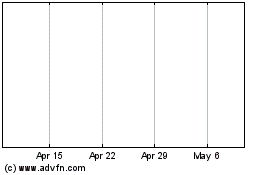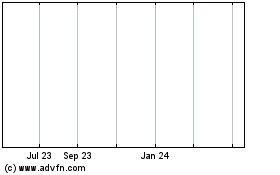Samsung Seizes Smartphone Initiative as Sanctions Hobble Huawei
12 January 2021 - 10:43PM
Dow Jones News
By Elizabeth Koh
SEOUL--Huawei Technologies Co.'s sanctions-induced smartphone
slump has rivals seeing opportunity in a market where switching
brands is rare.
With U.S. restrictions curbing its access to key parts, Huawei
has suffered a plunge in sales in recent months, most strongly
benefiting South Korea's Samsung Electronics Co. and other Chinese
makers.
Samsung, the world's largest smartphone maker, will be moving
roughly a month ahead of its usual timetable when it launches its
new flagship Galaxy S21 on Thursday--capitalizing on No. 2 maker
Huawei's weakness, industry analysts say. Samsung recently forecast
a 25% jump in quarterly operating profit, aided by a resurgence in
phone sales.
Not long ago, Huawei seemed on track to meet its oft-touted goal
of permanently unseating Samsung. But in the three months ended
Sept. 30, its global market share shrank by nearly a quarter from a
year earlier to 15% while Samsung's grew to 23%, according to
market researcher Canalys Inc. Lower-cost Chinese operators like
Xiaomi Corp. and Vivo Electronics Corp. also gained.
Those trends persisted during the final months of 2020, industry
analysts say, with estimates for a slight retraction in shipments.
The overall smartphone market has been struggling to recover from
the coronavirus pandemic's blows last spring and summer. Analysts
say they expect consumer demand to return to pre-pandemic levels
this year.
"Samsung has recovered a lot better than most, and that's mostly
because of Huawei's problems," said Mark Newman, a senior analyst
at the brokerage Sanford C. Bernstein. "Huawei's share has just
been decimated."
Apple Inc. hasn't much gained from Huawei's troubles. Only about
10% of people using smartphones powered by Google's Android switch
to iPhones--a figure that's held steady for years, according to
Consumer Intelligence Research Partners LLC, a market
researcher--and just 7% switch the other way.
Samsung was in need of a misstep from Huawei. Big bets on 5G and
foldable screens had failed to reverse the South Korean company's
own multiyear smartphone sales slump. To better compete with
Chinese makers, Samsung had started packing its lower-price models
with features once reserved for its premium flagship products.
Huawei's pandemic trajectory initially looked enviable. Though
it was one of the first smartphone makers to be hit hard by
Covid-19, as China was where the virus was first detected, the
country's faster recovery boosted the company to the top of the
vendor list for the April-June quarter, when industry sales
nosedived 30%.
But since September, tightened Western sanctions have squeezed
Huawei's supply of chips for smartphones and consumer electronics,
and it is now eating through its stockpiles. Industry analysts say
some components could run out as early as spring, though the supply
could last through fall as it continues to slash product shipments.
Late last year, Huawei jettisoned its budget smartphone brand
Honor, which might help the former subsidiary avoid U.S. curbs.
Huawei's woes look likely to continue, at least into the
immediate future. Trade experts anticipate the administration of
President-elect Joe Biden will continue a tough stance against
China, perhaps easing measures slightly or leaning more on U.S.
allies to enforce their own restrictions.
"I would guess that the existing sanctions [on Huawei] stay in
place for a while," said Orit Frenkel, a former U.S. trade
negotiator and executive director of American Leadership Institute,
a Washington-based think tank. She added that Mr. Biden's first
priorities are likely to be domestic rather than international.
Even if tensions were to ease, Huawei would need time to
financially recover and reach its former capacity, said Canalys
analyst Nicole Peng: "They've lost a year's time in the game."
Other Chinese makers have seen an opening, especially as
Huawei's dominant perch in its home market of China also begins to
erode. They have also been jockeying to grow into Huawei's user
base with budget handsets.
Xiaomi has more than tripled its fraction of the Western
European market since early 2019 to 14%, surpassing Huawei, whose
share fell by more than half to 11%.
The strengths of smaller Chinese manufacturers include their
agility and feature-packed phones at budget prices, said Tom Kang,
a Counterpoint Research analyst. Samsung's marketing overhead is
higher, he said, and its product-development cycles longer.
"Huawei is definitely in decline," Mr. Kang said. "It's an
opportunity for those who are prepared."
Write to Elizabeth Koh at Elizabeth.Koh@wsj.com
(END) Dow Jones Newswires
January 12, 2021 06:28 ET (11:28 GMT)
Copyright (c) 2021 Dow Jones & Company, Inc.
Samsung Electronics (PK) (USOTC:SSNHZ)
Historical Stock Chart
From Nov 2024 to Dec 2024

Samsung Electronics (PK) (USOTC:SSNHZ)
Historical Stock Chart
From Dec 2023 to Dec 2024
